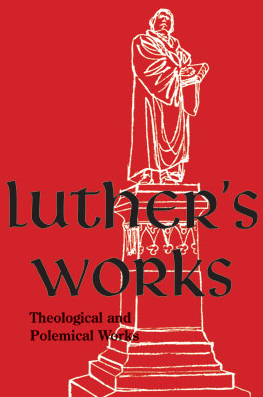
Part of Series
Luther s The American Edition, published by Concordia and Fortress Press between 1955 and 1986, comprises fifty-five volumes. These are a selection representing only about a third of Luther s works in the Latin and German of the standard Weimar Edition, not including the German Bible. When Luther was prevailed upon to write a preface to the projected complete edition of his Latin writings in 1545, about a year before his death, he took the opportunity to review the high points of his career to show that he really never had the time and talent to produce literature worth preserving, that in publishing these works he was now merely yielding to his friends' argument that his works would be published in any case, if not with his cooperation, then possibly by men who had no real understanding of them. That was one thing. But in that preface Luther also implored the reader of his Latin writings "for the sake of our Lord Jesus Christ Himself to read those things judiciously, yes, with great commiseration". With Luther's lectures on the Epistle to the Romans he had a splendid opportunity to share with his students the great find of his life, "that place in Paul which was for me truly the gate of Paradise." Also available as an eBook (ePub)
Author

Martin Luther (1483-1546) was a German monk, theologian, university professor and church reformer whose ideas inspired the Protestant Reformation and changed the course of Western civilization. Luther's theology challenged the authority of the papacy by holding that the Bible is the only infallible source of religious authority and that all baptized Christians under Jesus are a spiritual priesthood. According to Luther, salvation was a free gift of God, received only by true repentance and faith in Jesus as the Messiah, a faith given by God and unmediated by the church. Luther's confrontation with Charles V at the Diet of Worms over freedom of conscience in 1521 and his refusal to submit to the authority of the Emperor resulted in his being declared an outlaw of the state as he had been excommunicated from the Roman Catholic Church. Because of the perceived unity of the medieval Church with the secular rulers of western Europe, the widespread acceptance of Luther's doctrines and popular vindication of his thinking on individual liberties were both phenomenal and unprecedented. His translation of the Bible into the vernacular, making it more accessible to ordinary people, had a tremendous political impact on the church and on German culture. It furthered the development of a standard version of the German language, added several principles to the art of translation, and influenced the translation of the English King James Bible. His hymns inspired the development of congregational singing within Christianity. His marriage to Katharina von Bora set a model for the practice of clerical marriage within Protestantism. Much scholarly debate has concentrated on Luther's writings about the Jews. His statements that Jews' homes should be destroyed, their synagogues burned, money confiscated and liberty curtailed were revived and used in propaganda by the Nazis in 1933–45. As a result of this and his revolutionary theological views, his legacy remains controversial.


